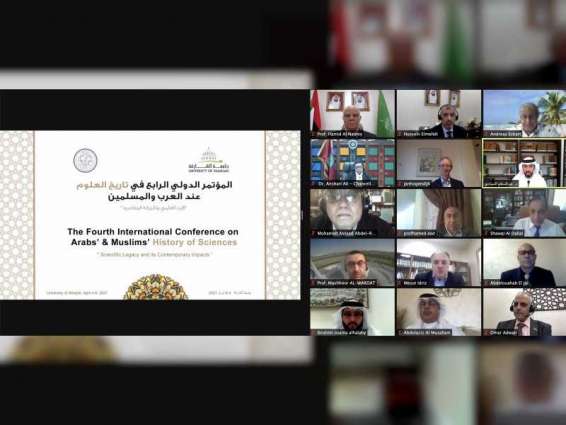SHARJAH, (Pakistan Point News - 04th Apr, 2021) The University of Sharjah (UoS) today launched the Fourth International Conference on Arabs' and Muslims' History of Sciences, organised by the College of Science under the umbrella of the Sharjah International Foundation for the History of Arab and Muslim Sciences (SIFHAMS) at the University of Sharjah, under the theme: "Scientific Legacy and its Contemporary Impacts."
The conference was held in cooperation with the University of Cologne in Germany and King Abdulaziz University in the Kingdom of Saudi Arabia.
Scholars, researchers and directors of universities, research centres, libraries and international museums participated in the conference, and the number of registered participants reached more than 900 from more than 40 Arab and Islamic countries, and from countries throughout the world. Conference activities will last for three days using the virtual communication platform Zoom.
The Conference includes 21 scientific sessions, during which more than 130 scientific and research papers will be presented by distinguished scholars, specialists and graduate students who work in various fields of applied sciences, engineering, medical, health, humanities and social sciences. The scientific papers are also charachterised by diversity, which revolves around embodying the achievements and innovations of early Muslim scholars in all applied sciences, including engineering, medical, health, humanities and architecture.
Prof. Hamid M.K. Al Naimiy, Chancellor of the UoS, opened the Conference sessions delivering a speech on behalf of H.H. Dr. Sheikh Sultan bin Muhammad Al Qasimi, Supreme Council Member, Ruler of Sharjah, President of UoS, welcoming the attendees who joined to share their scientific knowledge, despite the challenges presented by the COVID-19 pandemic.
He added that it was important to highlight the significant contributions of Arab and Muslim sciences in their various fields, from the start of the Islamic Civilisation to the modern days.
The Ruler of Sharjah added that challenging the current conditions lies not only in the importance of these contributions to contemporary human civilisation, but lies in their forming the basis for many scientific and technological developments around the world, while neglecting their Arab and Muslim origins. This conference, therefore, works to reaffirm the role of Arab and Muslim scientists to these modern scientific and knowledge developments.
The Chancellor stressed the importance of this scientific event, which will contribute to clarifying the role of early Arab and Muslim scholars in scientific development, and preserve Muslim civilisation's rich scientific heritage. It will contribute to building the current and future generations intellectually, on the constants of that heritage and its original values, so that they believe in the transcendence and magnification of their religion that built one of the highest civilisations.
For his part, Dr. Abdul Aziz Al Musallam, Chairman of the Sharjah Institute for Heritage, said the conference's theme combines the various contributions made by Muslim scholars throughout history due to their pivotal and influential role in human civilisation and scientific development. He added that this conference launched in the Emirate of Sharjah – the hub for culture and scientific knowledge aspirations thanks to the pioneering role of the Ruler of Sharjah in restoring Arab and Muslim culture and knowledge. He also stressed that the Islamic civilisation, at its height, made many immortal contributions and pioneering discoveries in all scientific fields, including: medicine and pharmacy, anatomy, surgery, astronomy, geography, chemistry, and mathematics. Muslim scientists were the first to invent the experimental method in their handling of scientific and astronomy data, which had a great impact on establishing the foundations of the experimental scientific method, followed to day globally, he said.
Some of those great Arab and Muslim scholars, he added, included Ibn Al-Nafees, Al-Khwarizmi, Jaber Ibn Hayyan, Doctor Al-Zahrawi, Al-Biruni, Al-Kindi, Al-Masoudi, Al-Bakri, Al-Atakhari, Al-Qazwini, Doctor Ibn Jazlah, Abbas Ibn Firnas, and others. Muslims also excelled in industries, especially the paper industry, which they were credited with spreading around the world at the time.
The opening session of the conference also included speeches by the main speakers of the conference. Prof. Erwin Andreas Eckart, Physics Department at the University of Cologne in Germany, provided an introductory overview of his scientific study entitled "Milky Way in the Arab Culture" that evaluated the role of the Islamic scholar Ibn al-Haytham in this field.
Prof. Jan Pieter Hogendijk, Professor at the Department of Mathematics at the University of Utrecht in the Netherlands, presented many scientific inventions by Muslim scholars that were used in the middle Ages in determining directions, dimensions, and times that were proven extremely accurate.




